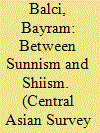|
|
|
Sort Order |
|
|
|
Items / Page
|
|
|
|
|
|
|
| Srl | Item |
| 1 |
ID:
058742


|
|
|
| 2 |
ID:
080413


|
|
|
|
|
| Publication |
2007.
|
| Summary/Abstract |
This paper explores Islam in Georgia and analyses empirical results from preliminary field research in Tbilisi, more particularly in Kvemo-Kartli, whose inhabitants are predominantly Shi'ites and ethnic Azeris, as well as in Adjaria, where Sunni Adjars are resisting attempts at (re)-Christianization. Moreover, field inquiries were carried out in the Pankisi Valley, where approximately 6000 Kists live. Most publications dealing with Georgia's history neglect the role of Islam in the process of nation and state building and tend to forget that it was at some point in time one of the constituent components of the country's consolidation as a state. Most scholars insist on recalling that, right after Armenia, Georgia was one of the first nations to adopt Christianity as state religion. Therefore, when referring to Islam, the latter is often presented as an alien, extraneous and aggressive element. After 70 years of Soviet atheism, the newly independent state ideologically and strategically promotes Orthodox Christianity as central element of Georgian identity. All Islamic communities and institutions in Georgia, be they Sunni or Shi'ite, are theoretically under the central authority of the imam of Tbilisi's central mosque, Akhund Hadji Ali, himself dependant on the Baku-based Administration of the Muslims of the Caucasus. The reality shows, however, that there are two major separate Muslim communities living in Georgia: the Shi'ite Azeris and the Sunni Adjars, who scarcely co-operate. The place of Christianity in the national ideology and the promotion of Christian values tendentiously lead to the marginalization or exclusion of Muslims from the national community. However, in their day-to-day life, Muslims are not discriminated against, and most of the time all religious communities live together in good harmony. In general, Islam is considered as a 'traditional' religion, and as such is tolerated by the Georgian authorities, which differs very much from the way they reject 'non-traditional' religions
|
|
|
|
|
|
|
|
|
|
|
|
|
|
|
|
| 3 |
ID:
065676


|
|
|
| 4 |
ID:
110791


|
|
|
|
|
| Publication |
2012.
|
| Summary/Abstract |
After two centuries of close relationships, especially under the Mughals, Islamic ties between India and Central Asia have been considerably weakened, first after the Tsarist colonization and then by Soviet religious repression and ideological isolation. However, when Central Asian post-Soviet republics became independent in 1991, they renewed all kinds of links with the Indian subcontinent. Moreover, the revival of Central Asian Islam benefited from inspirational international Islamic sources from Turkey, the Arab countries and India. The latter drew less attention from analysts than other sources of influence, although it has gained ground all over the region in past years, particularly in Kazakhstan and Kyrgyzstan, where the India-based Jama'at al Tabligh has achieved significant success. This Islamic organization, established in British India in the 1920s, defines itself as a non-radical and non-political movement, promoting 'basic' Islamic faith and practice. So far, the Jama'at al Tabligh has been tolerated by local authorities who would rather use them as a shield against the more radical Islamic groups that are openly opposing the regime.
|
|
|
|
|
|
|
|
|
|
|
|
|
|
|
|
|
|
|
|
|